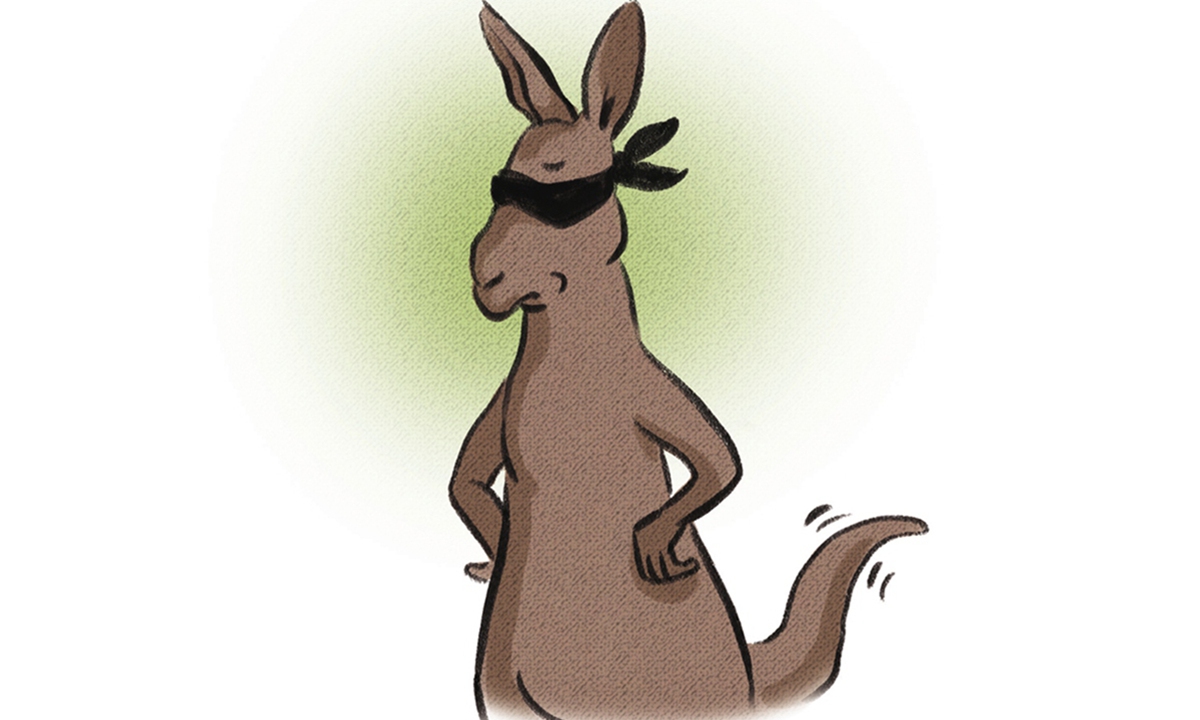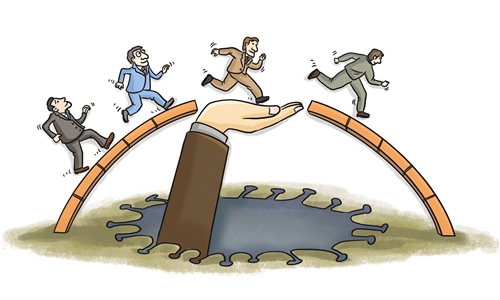Why human rights violations in Australia's offshore detention centers are appalling

Australia's blindness Illustration: Liu Rui/GT
"China has launched another furious attack on Australia's human rights record," Australian Broadcasting Corporation (ABC) reported after Australia's third Universal Periodic Review took place at the 47th session of the United Nations Human Rights Council.In fact, Russia, Nepal, Syria, the Marshall Islands, and the UN Refugee Agency also expressed deep concerns about Australia's human rights violations, urging Canberra to take practical measures to protect and improve human rights. The focus of international attention pertains to Australia's infamous offshore detention centers.
Recently, the Catholic Bishops Conference of Papua New Guinea (PNG) and Solomon Islands sent an open letter to the Australian Parliament, condemning the humanitarian crisis caused by Australia's policy of offshore detention of refugees. It called on Canberra to shut down the offshore detention centers located in Manus Island and Nauru and to properly settle the refugees.
Canberra was urged to abandon colonialism and respect the sovereignty, independence and rule of law of the Pacific Island countries. The above-mentioned religious groups have great influence in the Pacific Island countries, and their sharp criticism of Australia has caused strong resonance. How many evil deeds have been done in these detention centers? Why has Australia's immigration policy come under so much fire?
The offshore detention policy, first introduced in 2012, requires all refugees, asylum seekers, and illegal immigrants who were smuggled to Australia by boat to be sent to offshore refugee camps, located on Manus Island, PNG, or the island nation of Nauru, for mandatory centralized detention. Refugees there live in harsh conditions, waiting indefinitely for entry approval. According to the latest figures released by the Refugee Council of Australia in July, offshore refugee camps have so far accommodated 4,183 people, of which less than 30 percent have been permitted to enter Australia. The remaining 3,000 people have been sent to other countries, forcibly repatriated to their home countries, or even kept in custody and tortured.
The "Nauru Documents," leaked by chance in 2016, exposed the dark truth of offshore refugee camps. This over-8,000-page report disclosed the shocking cases of beatings, self-harm, sexual assault, child abuse and inhuman living conditions suffered by the refugees. This triggered strong international backlash, including from the medical communities. These detention camps were denounced as Nazi-style "concentration camps." Food and drinking water supplies are severely inadequate. Safety is not guaranteed. Housing, medical treatment and epidemic prevention are extremely poor. Mobile phones and other communication devices are confiscated.
Detainees have suffered long-time physical and psychological abuse. Many have died abnormally. According to a survey by the UN Refugee Agency, more than 80 percent of refugees suffered from mental illnesses, such as depression, anxiety and post-traumatic stress disorder (PTSD).
Australia's policy has been repeatedly criticized by international organizations and other countries. UN High Commissioner for Human Rights Michelle Bachelet criticized Australian offshore detention centers as an "affront to human rights," and Office of the United Nations High Commissioner for Human Rights has repeatedly called on the Australian government to fulfill its international human rights obligations and ensure the rights of refugees to seek and enjoy asylum. The International Criminal Court said what the Australian government has done to refugees is a "cruel, inhuman or degrading treatment" and is unlawful under international law. The PNG Supreme Court ruled that the detention centers are in serious breach of the PNG Constitution and called for their closure. However, the ruling was dismissed by the Australian government. Senior health officials in Nauru have expressed concerns about the centers, calling them a "national disgrace," but Australia continues doing what it wants.
Behind Australia's persistent disregard for criticism is the mentality typical of a "human rights preacher." For a long time, Australia and other Western countries have been recklessly interfering in the internal affairs of other countries and openly exerting pressure under the pretext of human rights. But when developing countries raise concerns about their human rights problems, they are either selectively ignored or faintly explain themselves.
The serious human rights problems exposed by Australia's offshore detention centers are only the tip of the iceberg. Under the hypocritical mask of "human rights preacher" are undiscovered crimes and evil deeds.
We urge Australia and its Western allies to seriously reflect on what they have done, and take practical measures to solve their own human rights problems. For many years, these Western countries have been wielding human rights as a stick to suppress developing countries while silencing criticisms toward their own human rights problems. Justice is justice. Forever gone are the days when Western countries can rest comfortably on their evil deeds.
The author is a current affairs commentator. opinion@globaltimes.com.cn


